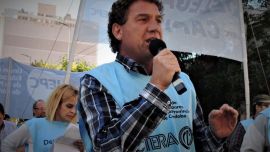Although the formal name of this city was changed by constitutional reform almost three decades ago, in all that time its citizens as often as not have preferred to write down the old “Capital Federal” rather than the more cumbersome “Autonomous City of Buenos Aires” (CABA in its Spanish acronym) when required to identify their residence in the process of filling out some form (a frequent enough chore in this day and age). And nobody except the most pedantically legalistic mind attached any importance to the difference between the two labels – until now.
But this city’s autonomy abruptly ceased being a constitutional abstraction this week when it was challenged amid the flurry of curveballs being hurled by Vice-President Cristina Fernández de Kirchner in the last 10 days ever since her corruption trial reached the stage of the prosecution requesting a prison sentence. None of the issues raised bears any relation to the burning socio-economic problems of the country and nor do they stand much chance of being transformed into reality with such initiatives as a Supreme Court of 25 justices punching in the air. Yet for some mysterious reason anything involving the fiery veep acquires a centrality denied an economy on the rocks or even comparable issues. Thus massive downtown picket chaos week after week meets with general if reluctant acceptance as a fact of life and yet a relatively small cluster of militants in one street corner of Recoleta is seen as a point of no return by both sides. And yet who would say that the judicial problems of Cristina Fernández de Kirchner are more important than the misery of millions reflected by the social organisations?
Complaining of a “political police” harassing her militant supporters outside her flat, the vice-president asserts that the Constitution “does not speak of autonomy” but she is thus confusing the division of powers between national and subnational levels of government in a federal system with an incomplete transfer of policing. Article 129 of the Constitution, as reformed in 1994, reads: “The city of Buenos Aires will have a regime of autonomous government with its own prerogatives of legislation and jurisdiction and its head of government will be directly elected by the people of the city.” What could be clearer? The City Hall Cabinet has included a security minister with no questions asked until now whereas it does not have a foreign or defence minister which would indicate that policing falls within its brief – even as a concurrent power since there is a Security Ministry at both national and subnational levels, as also occurs with other portfolios such as education and health.
The problems do not arise from the constitutional text as drafted by the 1994 convention but from what happened afterwards. With the probability of an opposition mayor emerging from the first direct elections in 1996, the Peronist central government moved to clip his wings with the “Ley Cafiero” (named after the current Foreign Minister’s grandfather, then a senator) which kept the Federal Police in national hands, as well as the regulation of transport and public services – this was also fed by the reluctance of inland Peronists to fund the costs of transfer for policing. But in the 2007 elections then-president Néstor Kirchner tried to reinforce the institutional varnish being sought for his wife’s “Cristina, Cobos y vos” campaign by generously granting the city its own police. Yet Mauricio Macri’s City Hall and Cristina Fernández de Kirchner’s presidency subsequently failed to reach agreement over the transfer with the former creating the Metropolitan Police in 2010 alongside the Federal Police. The double trouble arising from this dual policing is the institutional root of all the back and forth around the veep’s flat in the past week.
Since then the arguments have raged between and within both sides with worrying undertones of violence at times – the chaos suffered by local residents versus Máximo Kirchner not being allowed to visit his own mother, PRO chair Patricia Bullrich’s insistence on a firm stand being taken against contempt of court disrupting freedom of movement versus City Mayor Horacio Rodríguez Larreta’s reluctance to intervene until the militants added pyrotechnics to their repertoire. But rather than taking sides in these arguments, this editorial would like to conclude by proposing that we move on from this national obsession with a political firebrand to tackle this country’s very real problems.


















Comments